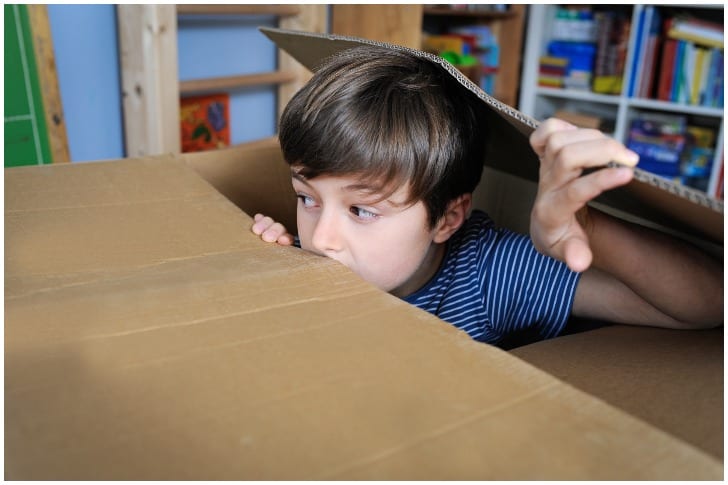
You Seemed to Have Adapted to Lockdown Life, But Have You Checked On Your Kid?

The COVID-19 pandemic has taken the world by storm. Everyone seems to be adapting or trying to adjust to the changes in these times of uncertainty. Parents are still trying to figure what’s best for their children at a time when all existing daily routines have gone for a toss.
Reports have suggested that stay-at-home directives are leading kids to trauma. With signs like outbursts, yelling, and hostility becoming a common occurrence, parents should be warier of their children’s mental health and wellbeing. Take a look at the symptoms you should watch out for.
Lack of Concentration

Photographee.eu/Shutterstock: Kid Teasing Mother
A school environment often acts as a stimulus for children, helping them focus on duties better. Without this setting, they might lack concentration or not be able to follow instructions. Trying to make your child express their feelings and asking the right questions will certainly help in such instances. Besides, involving them in craftwork and playing games as a family can go a long way in retaining their attention.
Behavioral Changes
While this is a tough nut to crack, stay on the lookout for unusual mood swings like acts of defiance and tantrums. In some cases, the indication could be more subtle such as long bouts of being quiet or bearing a worn-out look. Children might not take it too well when they see parents assuming a role that has been reserved for teachers and friends.
Recurrence of Past Habits

granata68/Shutterstock: Kid Hiding Inside a Box
In the case of lockdown anxiety, your kids can regress to their past behaviors such as wetting the bed, hiding in a safe place, or erratic food intake. It is alright to be supportive during such times, but if the issue takes a turn towards worse, it would be best to consult an expert.
Abnormal Sleeping Cycle
Link in the case of youngsters and adults, insomnia or abnormal sleep cycles can wreck the lives of growing kids too. Losing rest on rare occasions should not be a problem, but you need to take stock of the situation if it keeps recurring.
Boredom as a Sign of Depression

Yiorgos GR/Shutterstock: Bored Kids Watching TV
An increased level of visible dullness can come with many underlying issues. Lack of physical and mental exercise can lead to persistent boredom – a symptom of depression. Periodically, try to organize game-time or fun exercise sessions for them.
Anti-social Behavior
If they are ordinarily very social and are starting to look distracted or quieter than usual, then it’s time for an intervention. Encourage kids to participate in conversations and get them to interact with friends and family members virtually.
During a time like this, it’s normal for adults to feel less patient and more agitated towards a stubborn family member, but when it’s the matter of kids—making them feel safe and well-adjusted is more important than anything else.
More in Medicare
-
`
Kidney Infection: Causes, Symptoms, Prevention & Treatment
Kidney infections – AKA pyelonephritis – are serious health conditions that can lead to severe discomfort. But does kidney infection cause...
September 19, 2024 -
`
What to Do in Ubud, Bali – Top Attractions & Activities
Ubud, the cultural heart of Bali, offers an array of activities that capture the essence of this enchanting island. From exploring...
September 11, 2024 -
`
Important Aspects of Your Health You Should Pay Attention To
When thinking about your health, it’s crucial to consider the key factors that create a solid foundation for your well-being. These...
September 6, 2024 -
`
6 Creative Birthday Party Ideas For Adults
Gone are the days when birthdays were just about cakes and candles. Now, it is all about creating memorable experiences that...
August 28, 2024 -
`
Are Chanel and Johnny leaving Days of Our Lives? Here Are the Facts
Fans of Days of Our Lives have been on the edge of their seats, wondering if Chanel and Johnny are leaving...
August 20, 2024 -
`
How Much Does Massage Business Make? A Profitability Breakdown
Curious about how much does massage business make? The massage spa industry in the United States is a significant sector, with...
August 14, 2024 -
`
How to Stay Healthy During Cold and Flu Season
Cold and flu season can be a daunting time, with the risk of illness looming large. Missing work, classes, or social...
August 9, 2024 -
`
Which US Virgin Island Is the Best for Your Dream Vacation
Choosing the perfect island for your dream vacation can be challenging, but each of the U.S. Virgin Islands offers something unique...
July 31, 2024 -
`
Is Taylor Swift ‘Officially’ Engaged to Travis Kelce?
Is Taylor Swift engaged to Travis Kelce? This question has been buzzing around fans lately. Well, their relationship has been nothing...
July 23, 2024















You must be logged in to post a comment Login